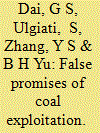| Srl | Item |
| 1 |
ID:
128440


|
|
|
|
|
| Publication |
2014.
|
| Summary/Abstract |
The evaluation of natural capital and environmental services has always been an important step in the implementation of sustainable development concepts and policies. The results presented in this study address the demand for environmental support of the economy of Xilinguole League in the Inner Mongolia Autonomous Region as well as the value of its natural and human-made capital. The results show that the reliance of the economy of Xilinguole League on local and imported non-renewable resources (coal and minerals) decreases both the environmental and economic sustainability of the area. Emergy-based performance indicators of the Xilinguole League economy show a low sustainability index (ESI=0.79), though it is higher than for the Chinese economy as a whole (ESI=0.47), as well as a low percentage of renewable resources being used (%REN=0.16, though this is higher than for all of China, 0.09). In contrast, the grassland-based livestock sector shows a higher renewability index (%REN=0.67) and sustainability (ESI=9.61). The emergy exchange ratios (exported emergy/imported emergy) are calculated to be 4.38 for the livestock system and 4.28 for the Xilinguole economy, which is much higher than the value of 1.74 for the overall Chinese economy, indicating uncompensated overexploitation of local systems (meat and coal, respectively). Intensified coal exploitation and intensive cattle grazing are discussed to support the decision-making process for setting local energy policy and ecological compensation. It is proposed that conservation of coal resources (avoiding misuse and moderating excess extraction and trade) and protection of natural grassland capital are more advantageous in emergy terms than the "blind" pursuit of accelerated, economic growth.
|
|
|
|
|
|
|
|
|
|
|
|
|
|
|
|
| 2 |
ID:
128345


|
|
|
|
|
| Publication |
2014.
|
| Summary/Abstract |
The grasslands of Inner Mongolia are not only the source of the necessary resources for the survival and development of herdsmen, but also represent a significant green ecological barrier in North China. Coal-mining production is important in maintaining GDP growth in Inner Mongolia. However, over-exploitation has created serious problems, such as pollution of the environment and significant decreases in grassland ecosystem services, in addition to impacting the well-being of herdsmen and other humans. Based on questionnaires survey performed among 864 herdsmen addressing the relationship between coal exploitation in grasslands and human well-being in Xilinguole League in Inner Mongolia, we found that (1) coal resource exploitation in these grasslands does not benefit the herdsmen by increasing their income; (2) the rapid development of this resource has not obviously materially improved the life of the herdsmen; and (3) these activities have increased the risks that herdsman will have to endure in the future. Overall, coal resource exploitation in grasslands has more negative than positive effects on the well-being of herdsmen. We propose the conservation of coal resources and improvement of ecological compensation should be carried out without blindly pursuing economic growth, instead of focusing on economic development and structural adjustments.
|
|
|
|
|
|
|
|
|
|
|
|
|
|
|
|